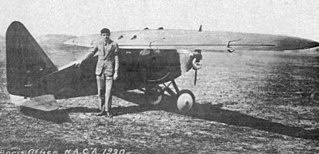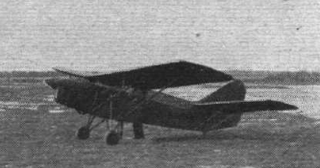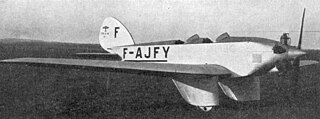
The Mauboussin M.120 was a trainer and touring aircraft built in France in the 1930s and again in the years following World War II.

The Peyret-Mauboussin PM XI was a French high-wing touring aircraft of the early 1930s.

The Peyret-Mauboussin PM X, PM 4 or Mauboussin M.10 was a low power, single-seat, high wing cantilever monoplane. Only one was built but it set several records in the under 250 kg (550 lb) class both as a landplane and a floatplane.

The Potez 40 was a French three-engine, braced high-wing monoplane designed and built in response to a French government programme for colonial transport and policing aircraft duties.
The Caudron C.251 Et-2 was a French tandem seat, open cockpit biplane designed as an intermediate trainer and built in 1931. It did not go into production.

The Albessard Triavion, sometimes known as the Peyret-Albessard Triavion, was a three surface aircraft, combining a tandem wing and conventional tailplane.

The SFCA Taupin was a French tandem-wing aircraft, designed to provide a simple, stable and safe aircraft able to take-off and land in small spaces.

The Albert A-60 was a single engine, two seat, wooden sports monoplane designed and built in France in the early 1930s. Two were built and flown with three different engines.
The Dupuy D-40 was a French built, low powered monoplane designed for touring abroad. The only example was used for an uncompleted journey to Saigon.
The Régnier 12 was a 1930s Belgian touring aircraft offering variants with different engines and seating plans. Only one was built.

The Dewoitine D.480 was a French single engine side-by-side sports and training aircraft built in the early 1930s. Two were completed and flew with several different radial engines. One remained active through the 1950s.
The Kellner-Béchereau 23 was a French two seat cabin touring aircraft, built in 1932. Its wing was constructed in a novel way. Only one was completed.
The Potez 42 was designed and built in 1930 to meet a French government requirement for a small air ambulance capable of operating in the colonies. It did not reach production.

The Guillemin JG.10 or Blériot-Guillemin JG.10 was a French two seat touring aircraft, designed to be as simple and safe to fly and maintain as a car, with similar facilities, as well as provision for parachutes.
The Poite 3 was a one-off, all metal touring aircraft which seated two in tandem. It was built and flown in France in 1931.

The Peyret-Nessler Libellule (Dragonfly) was a French two-seat, low-powered parasol wing light aircraft built in 1927 to provide practical but economical flying. It was one of the first of these French avionettes.

The Guerchais-Henriot T-2 was a French low-power, two-seat cabin cantilever monoplane built in 1928. Only one was flown.

The Bourgois-Sénémaud AT was a parasol wing, two seat touring aircraft built in France in 1928. Three examples were completed.
The Muniz M-5 was the first of Antonio Guedez Muniz's aircraft designs to fly; soon afterwards he became the first Brazilian to design an aircraft which reached series production. The sole example of the M-5, built while he was a student in France by Caudron, was a low wing cabin tourer or military liaison aircraft.

The Albert A-10 was a four-seat French transport aircraft which could be rapidly converted into an air ambulance. Two or three examples were built between 1929 and 1932, using at least two different engines, but neither variant reached production.















